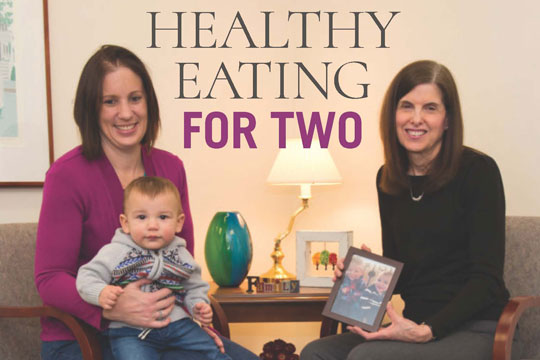Kimberly is grateful for the support she received at CMC. “Each time I got pregnant, it was a team effort,” she says. “Dr. Fekry and Karen made sure my babies stayed healthy.”

Some pregnant women crave ice cream. Others crave pickles, potato chips or steak. For Kimberly Ryllun, it was Devil Dogs. Sometimes she’d even wake up in the middle of the night to munch on one of those cream-filled, chocolate snack cakes.
A late-night pantry raid might not be a problem for most pregnant women, but Kimberly had gestational diabetes and needed to keep her blood sugar under tight control for the health of her baby and herself. Thankfully, she was able to turn to Karen Hodge, RD, a certified diabetes educator at the Center for Diabetes Education at Community Medical Center (CMC), for guidance.
“With my tendency to wake up in the middle of the night and eat sweets, Karen’s recommendation was to try to eat more protein for my evening snack— like mixed nuts or some cheese—so that I wouldn’t wake up hungry and eat things that I shouldn’t,” says Kimberly,43, of Barnegat.
Gestational diabetes affects 2 to 10 percent of pregnancies, according to the Centers for Disease Control and Prevention. The hormonal changes and weight gain associated with pregnancy cause some women to become resistant to insulin—a hormone that regulates blood sugar—making it a struggle for them to control their blood sugar. Fortunately, gestational diabetes can be successfully managed with diet, exercise and sometimes medication.
“If a woman’s blood sugar is controlled, she doesn’t usually experience any of the adverse effects of gestational diabetes,” says Samuel Fekry, MD, Kimberly’s obstetrician. These effects include high birth weight, which can lead to a difficult delivery or C-section, and preeclampsia, a dangerous form of high blood pressure that increases the risk of premature birth or stillbirth. Women who’ve had gestational diabetes are at greater risk for developing the condition during subsequent pregnancies.
Controlling Carb intake and cravings
Kimberly was no stranger to gestational diabetes. She first developed the condition when she was pregnant with 14-year-old twins Meghan and Matthew from a previous marriage. When she became pregnant again with Ethan, now 2½, she was diagnosed early with the condition. Dr. Fekry immediately referred her for nutrition counseling. During the counseling appointments, which were monthly at first and more frequent toward the end of her pregnancy, Kimberly and Hodge discussed how well the gestational diabetes was being controlled. They also determined whether Kimberly’s food choices or the frequency of her meals needed to be adjusted.
“Women with gestational diabetes need to control their carbohydrate intake because it has the greatest impact on blood sugar,” explains Hodge. “Since mom and baby need carbohydrates as an energy source, we teach moms how much they can safely consume—and how to count carbs.” Kimberly learned to cope with her cravings for sweets by opting for a protein-rich smoothie made with fruit or a smaller portion of a sugary treat.
“Sometimes just taking a small bite of a Devil Dog helped to curb the craving,” she says. “The key was always portion size.” Kimberly checked her blood sugar four times per day. Each morning, she tested her urine for the presence of ketones, chemicals that indicate inadequate carbohydrate and/or calorie intake. She was also diligent about keeping a record of the foods she consumed. Kimberly tried to work in exercise, which helps lower blood sugar, by walking around the field at her twins’ soccer practice or at the mall.
Eventually, she needed medication to maintain optimal blood-sugar control. “Kimberly was very motivated, and she had very tight control of the numbers,” says Dr. Fekry. The delivery went well, and Kimberly became pregnant a third time. She developed gestational diabetes again and managed the condition with the help of Dr. Fekry and Hodge. In May 2018, she gave birth to another healthy boy, Evan. Today, Kimberly says her health is good aside from the fatigue associated with trying to keep up with two teens, a toddler and a baby. She’s also working to complete an associate’s degree in business at Ocean County College.
Kimberly is grateful for the support she received at CMC. “Each time I got pregnant, it was a team effort,” she says. “Dr. Fekry and Karen made sure my babies stayed healthy.”
To learn more about the Center for Diabetes Education, call 732.349.5757 or visit www.rwjbh.org/cmcdiabetes